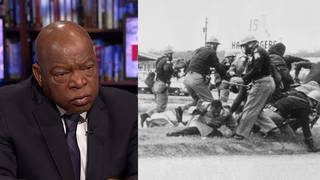
Guests
- Diane Nashhelped found the Student Nonviolent Coordinating Committee.
One notable civil rights activist who did not take part in this weekend’s commemorative march across the Edmund Pettus Bridge in Selma was Diane Nash, who helped found the Student Nonviolent Coordinating Committee (SNCC). She spoke at an event honoring civil rights foot soldiers and explained her opposition was based on the participation of former President George W. Bush. “The Selma movement stands for nonviolence and peace and democracy and fairness and voting rights. And George Bush stands for just the opposite. He stands for violence and war and stolen elections, and, for goodness sake, his administration had people tortured.” She argues it is a “huge mistake for Americans to leave the future of this country in the hands of elected officials. … Suppose we had waited for elected officials to desegregate lunch counters, buses, and to get the right to vote. I think 50 years later we would still be waiting.”
Transcript
AMY GOODMAN: After President Obama spoke, he walked across the Edmund Pettus Bridge along with Michelle and their daughters, Congressmember Lewis, former President George and Laura Bush and few dozen others. One notable civil rights activist who refused to take part in the symbolic walk was Diane Nash, who helped found the Student Nonviolent Coordinating Committee. Later in the day, she spoke in Selma and explained why.
DIANE NASH: After the event, there was a—like a march, and photographers. And I was all set to march with them. They had—they placed us—they had me in the front line. And then George Bush came out and got in the march. And I left. I decided I wasn’t marching anywhere with George Bush. The Selma movement stands for nonviolence and peace and democracy and fairness and voting rights, and George Bush stands for just the opposite. He stands for violence and war and stolen elections, and, for goodness sake, his administration had people tortured. I think this occasion was not appropriate for him to be here. I think for him to appear to be leading people involved in the nonviolent movement in this country, for photographs of that to go across the world would make it look as though we have sold out. I think that is an insult to people whose lives were taken—Reverend Reeb, Jimmie Lee Jackson, Viola Liuzzo. It’s an insult to me. And I think it’s an insult to everybody who really does believe in nonviolence.
That being said, I want to mention just a couple of things that I think might be of value as we continue the struggle now. And the first thing is, I think it would be a huge mistake for Americans to leave the future of this country in the hands of elected officials. Elected officials are not going to do what’s necessary in the interest of this country. It’s important—critical, in fact—that citizens take the interests of this country into our own hands, use nonviolence and make the necessary changes. I like to ask—suppose we had waited for elected officials to desegregate restaurants, lunch counters, public accommodations, buses, and to get the right to vote. I think 50 years later we would still be waiting.
My second point that I’d like to bring up is the issue of protest versus a nonviolent campaign. We’ve seen like the Occupy movement a few years ago, and now the hands up movement, and I believe that young people are on the right track. They are taking matters into their own hands. But one thing that I have observed is that I think sometimes we do not know how to differentiate between protest and a movement. In protests, it’s just what the word says: “I protest this. I do not like this.” Very often, the powers that be know that we don’t like what’s going on, but they’re determined to do it anyway. On the other hand, a nonviolent movement or a nonviolent campaign starts where you are right now, causes you to set a very clear, concrete objective. And I like to say also that it should be a written objective. Nobody can give you what you want unless you know what that is.
AMY GOODMAN: That was civil rights leader and SNCC co-founder, Diane Nash, speaking in Selma on March 7th, 50 years after the first Selma march that led to the Voting Rights Act of 1965. Part two of our special broadcast from Selma tomorrow. Democracy Now! is produced in Selma by Mike Burke, Hany Massoud and Denis Moynihan; in New York, Renée Feltz, Robby Karran, Aaron Maté, Nermeen Shaikh, Steve Martinez, Sam Alcoff, Deena Guzder, Amy Littlefield. Tomorrow, part two of our special broadcast from Selma and Montgomery, Alabama.












Media Options